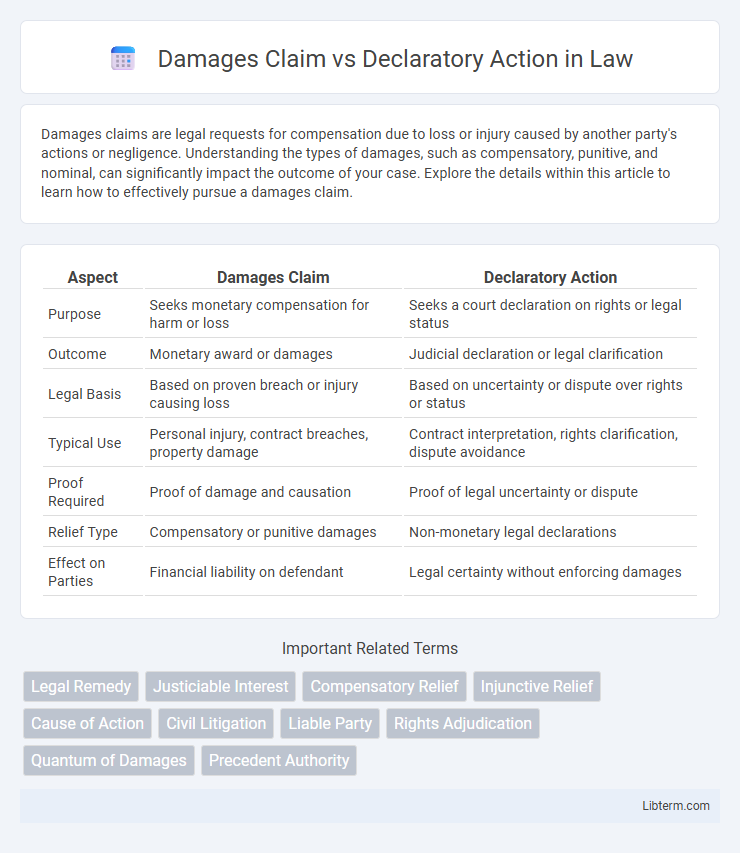Damages claims are legal requests for compensation due to loss or injury caused by another party's actions or negligence. Understanding the types of damages, such as compensatory, punitive, and nominal, can significantly impact the outcome of your case. Explore the details within this article to learn how to effectively pursue a damages claim.
Table of Comparison
| Aspect | Damages Claim | Declaratory Action |
|---|---|---|
| Purpose | Seeks monetary compensation for harm or loss | Seeks a court declaration on rights or legal status |
| Outcome | Monetary award or damages | Judicial declaration or legal clarification |
| Legal Basis | Based on proven breach or injury causing loss | Based on uncertainty or dispute over rights or status |
| Typical Use | Personal injury, contract breaches, property damage | Contract interpretation, rights clarification, dispute avoidance |
| Proof Required | Proof of damage and causation | Proof of legal uncertainty or dispute |
| Relief Type | Compensatory or punitive damages | Non-monetary legal declarations |
| Effect on Parties | Financial liability on defendant | Legal certainty without enforcing damages |
Introduction to Damages Claim and Declaratory Action
A damages claim seeks monetary compensation for harm or loss suffered due to another party's wrongful act, often involving breach of contract, negligence, or tort. A declaratory action, however, aims to establish the rights, duties, or legal relationships between parties without awarding damages, providing legal clarity and preventing future disputes. Both legal remedies serve distinct purposes: damages claim addresses past injuries with financial redress, while declaratory action resolves uncertainty over legal obligations.
Key Definitions: Damages Claim Explained
A damages claim is a legal request seeking monetary compensation for loss or injury caused by another party's actions or negligence. It quantifies financial harm to restore the claimant to their original position before the damage occurred. Unlike declaratory actions, damages claims require proof of actual harm and typically result in a monetary award rather than just a legal determination.
Key Definitions: Declaratory Action Explained
A declaratory action is a legal proceeding in which a party seeks a court's determination of their rights, duties, or obligations without requesting monetary damages or enforcement. Unlike a damages claim, which aims to compensate for losses incurred due to another party's wrongful conduct, a declaratory action clarifies legal relationships or interpretations of contracts and statutes. This proactive approach helps prevent future disputes by establishing legal certainty before harm occurs.
Legal Purpose: Why Choose Damages Claim?
A damages claim seeks monetary compensation for harm or loss caused by another party's actions, aiming to restore the injured party financially. This legal purpose directly addresses the tangible impact of wrongdoing, making it essential for plaintiffs needing reimbursement or loss recovery. Choosing a damages claim is strategic when quantifiable harm exists and the goal is financial remedy rather than merely affirming rights or legal status.
Legal Purpose: Why Pursue Declaratory Action?
Declaratory actions primarily establish the existence or interpretation of legal rights and obligations without seeking monetary compensation, providing clarity and preventing future disputes. This legal tool is essential when parties need a definitive court ruling on contract terms, property boundaries, or statutory interpretations to guide behavior or decision-making. Unlike damages claims, which resolve harm by awarding compensation, declaratory relief focuses on resolving uncertainties and securing legal certainty proactively.
Main Differences Between Damages Claim and Declaratory Action
Damages claims seek monetary compensation for harm or loss caused by another party's action, focusing on remedying past injury. Declaratory actions request a court's determination of legal rights or obligations without demanding damages or enforcement, often clarifying parties' positions in ongoing disputes. The main difference lies in the remedy sought: damages claims aim for financial redress, while declaratory actions seek legal clarity and prevention of future conflicts.
Procedural Steps: Filing a Damages Claim
Filing a damages claim begins with drafting a complaint that details the plaintiff's harm and the defendant's responsibility, followed by submitting the complaint to the appropriate court with payment of filing fees. The court then issues a summons to notify the defendant, who must respond within a specified timeframe, typically 20 to 30 days. The parties proceed to pre-trial activities including discovery, motions, and possibly settlement negotiations before the case advances to trial if unresolved.
Procedural Steps: Initiating a Declaratory Action
Initiating a declaratory action begins with filing a complaint that outlines the legal rights or status in dispute without seeking monetary damages. The plaintiff must demonstrate a justiciable controversy requiring court determination to prevent future harm or uncertainty. Court procedures then involve notifying the opposing party, followed by an opportunity for both sides to present evidence before the court issues a binding declaration of rights.
Legal Outcomes and Implications
Damages claims result in monetary compensation awarded to the plaintiff for losses suffered due to the defendant's actions, directly addressing financial harm and providing tangible relief. Declaratory actions establish the rights, duties, or obligations of parties without awarding damages, offering legal clarity and preventing future disputes. Legal outcomes from damages claims often involve enforcement mechanisms such as judgments or liens, whereas declaratory judgments primarily influence parties' behavior and legal strategy moving forward.
Choosing the Right Legal Action for Your Case
Choosing between a damages claim and a declaratory action hinges on the specific goals of your legal case; damages claims seek monetary compensation for losses incurred, while declaratory actions aim to establish the rights, duties, or obligations without awarding damages. If your primary objective is to recover financial losses due to breach or wrongdoing, a damages claim is appropriate; conversely, if you need a court's determination of legal rights to prevent future disputes, a declaratory action is optimal. Careful assessment of case facts, desired outcomes, and potential remedies is essential to selecting the most effective legal strategy.
Damages Claim Infographic

 libterm.com
libterm.com